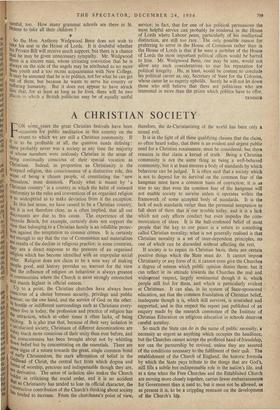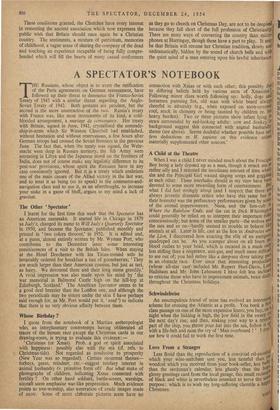A CHRISTIAN SOCIETY
FOR sOinesyears the great Christian festivals have been occasions for public meditation in this country on the extent to which we are still a Christian community. If It is to be profitable at all, the question needs defining: there probably never was a society at any time the majority of whose members were zealously Christian in the sense of being continually conscious of their special vocation as :‘,/ Christians. Indeed, in proportion as Christianity is the In this last sense, we have ceased to be a Christian country, but it is not therefore clear, as is often implied, that all our discontents are due to this cause. The experience. of the Juvenile Bench, for example, certainly does not support the 'iew that belonging, to a Christian family is an infallible 'protec- tion against the temptation to commit crimes. It is certainly nut enough to say that the rise of Communism and materialism are results of the decline in religious practice; in some countries, theY are a direct response to the pressure of an organised religion which has become identified with an unpopular social order. Religion does not claim to be a sure way of making l'eoPle good, and history provides no warrant for the view that the influence of religion on behaviour is always greatest qty' la communities where the Church is most strongly entrenched and stands highest in official esteem. ' Up to a point, the Christian churches have always been et honour, of a choice between security, privilege and public 90 ti°nour, on the one hand, and the service of God on the other. ,1,1:6 „la, hostile or indifferent surroundings such as Christians every- Ind the attraction, which at -other times it often lacks, of being its", 'mere live in today, the profession and practice of religion has ,Lit )(citing. It is also true that, because of their very isolation in Ail] secularised society, Christians of different denominations are rtY, t29aY much more conscious of their unity than ever before, and rial "Is consciousness has been brought about not by whittling some t do not Mt belief but by concentrating on the essentials. There are reit 't!tnie signs of a return towards the great, single common bond iell t'..,! early Christendom, the stark affirmation of belief in the the "odhead of Christ, the central fact from which dogma and 1.0 a -us of worship, precious and indispensable though they are, ire derivative. The sense of isolation also makes the Church ic;,rels bolder in criticising the social order, and it is no accident the, — as Christianity has tended to lose its official character. the ical Lill accepted religion, this consciousness of a distinctive role, this a sense of being a chosen people, of constituting the ' new 04 Jerusalem,' must diminish. Plainly what is meant by ' a ar. Christian country' is a country in which the habit of outward 111 conformity to the rules and conventions of an organised religion a Is so widespread as to make deviation from it the exception.
has tended to increase. From the churchman's point of view, therefore, the de-Christianising of the world has been only a mixed evil.
It is in the light of all these qualifying clauses that the claim, so often heard today, that there is an evident and urgent public need for a Christian renaissance, must be considered; but there remains in that claim a kernel of truth. Being a Christian community is not the same thing as being a well-behaved community, but it at least ensures a body of standards by which behaviour can be judged. It is often said that a society which is not to depend for its survival on the common fear of the hangman must have a common basis of conviction; it is as true to say that even the common fear of the hangman will not enable society to survive unless it operates within the framework ,of some accepted body of standards. It is the lack of such standards rather than the perennial temptation to fall short of them that is' our trouble today, and it is a lack which not only affects conduct but even impedes the com- munication of ideas. It is the half-confessed belief of most people that the key to our peace is a return to something called Christian morality; what is not generally realised is that Christian morality is a set of inter-dependent principles, no one of which can be discarded without affecting the rest.
If society is to regain its Christian basis, there are certain positive things which the State must do. It cannot impose Christianity or any form of it; it cannot even give the Churches a degree of esteem which public opinion denies them; but it can reflect in its attitude towards the Churches the real and widespread respect, largely sentimental though it is, which people still feel for them, and which is particularly evident at Christmas. It can also, in its system of State-sponsored education, see that the common foundation of Christian belief.
inadequate though it is, which still survives, is nourished and supported; and in this respect the report just published of an enquiry made by the research committee of the Institute of Christian Education on religious education in schools deserves careful scrutiny.
So much the State can do in the name of public necessity, a necessity as urgent as anything which occupies the headlines; but the Churches cannot accept the proffered hand of friendship, nor can the partnership be revived, unless they are assured of the conditions necessary to the fulfilment of their task. The establishment of the Church of England, the historic formula by which the State pays tribute to the things that arc God's, still fills a subtle but indispensable role in the nation's life, and at a time when the Free Churches and the Established Church are moving more closely together, carries fewer embarrassments for Government than it used to; but it must not be allowed, as as present it is, to be a crippling restraint on the development of the Church's lifp. These conditions granted, the Churches have every interest in cementing the ancient association which now expresses the public wish that Britain should once again be a Christian country. The sentiments, a mixture of patriotism, memories of childhood, a vague sense of sharing the company of the dead and touching an experience incapable of being fully compre- hended which will fill the hearts of many casual conformers as they go to church on Christmas Day, are not to be despised because they fall short of the full profession of Christianity, There are more ways of converting the country than micro' phones at Harringay, though these have a part to play. It maY be that Britain will resume her Christian tradition, slowly and undramatically, bidden by the sound of church bells and with the quiet mind of a man entering upon his lawful inheritance.



























 Previous page
Previous page